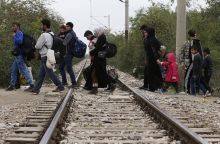
By Ann Marie Foley - 09 June, 2016

Caritas Europa and Jesuit Refugee Service (JRS) Europe has called on European leaders to alter the EU’s restrictive approach to migration as interior ministers discuss EU migration policies this week.
“Europe has the power to save and protect people. It’s a just question of political will to provide safe ways for people to enter Europe without risking their lives,” said Jean-Marie Carrière, Regional Director of JRS Europe.
“It’s time to defend and apply the very Refugee Convention that Europeans set up after World War II and to act upon our founding values.”
The charities say that current policies focused on deterrence, including the agreement with Turkey, are not stopping people from trying to reach EU countries.
Instead, they prolong suffering and push people into the hands of smugglers and traffickers, who find even more dangerous entry routes.

More than 1,000 migrants have died in less than a week while trying to cross the Mediterranean.
Caritas Europa and JRS Europe state that they are appalled by the continuous suffering of so many people and stand in solidarity with these women, men and children.
“Like Pope Francis, Caritas dreams of a Europe that acknowledges the necessary contribution of migrants to our societies and commits to respecting the dignity of every human being,” said Jorge Nuño Mayer, Secretary General of Caritas Europa.

The charities tell of a young Syrian woman who said she could not find a legal or safe way into Europe.
“Being smuggled to cross over to Greece was my only alternative. I knew it was a dangerous thing to do, but I was desperate. I had to cross to save my life and what is left of my soul,” she said.
She spoke to Caritas Greece staff a few days ago and said she had to leave Syria alone, was sexually abused on the way and smuggled across the Aegean Sea.
Caritas Europa and JRS Europe called on the EU and especially its Member States to:
• Open safe and legal channels of entry into the EU;
• Introduce a humanitarian visa, which is affordable and easily accessible via any EU embassy in countries of origin and transit;
• Facilitate family reunification for refugees and migrants, hence fostering integration in receiving countries;
• Extend the humanitarian admission programmes;
• Engage in more resettlement;
• Lift visa requirements when justified on humanitarian grounds.
At a European Parliament plenary session in Strasbourg on Tuesday this week, a majority of MEPs welcomed plans to step up cooperation with third countries, particularly in Africa, by increasing public and private investment there to support economic and social development and curb migration flows.
But many MEPs also warned against replicating the EU deal with Turkey.
The new European Commission proposals for a review of the “blue card” scheme for highly-skilled workers from third countries, which should simplify their admission and improve their living conditions, and for an action plan to promote successful integration of migrants within the EU, were also debated on in plenary session on Tuesday.